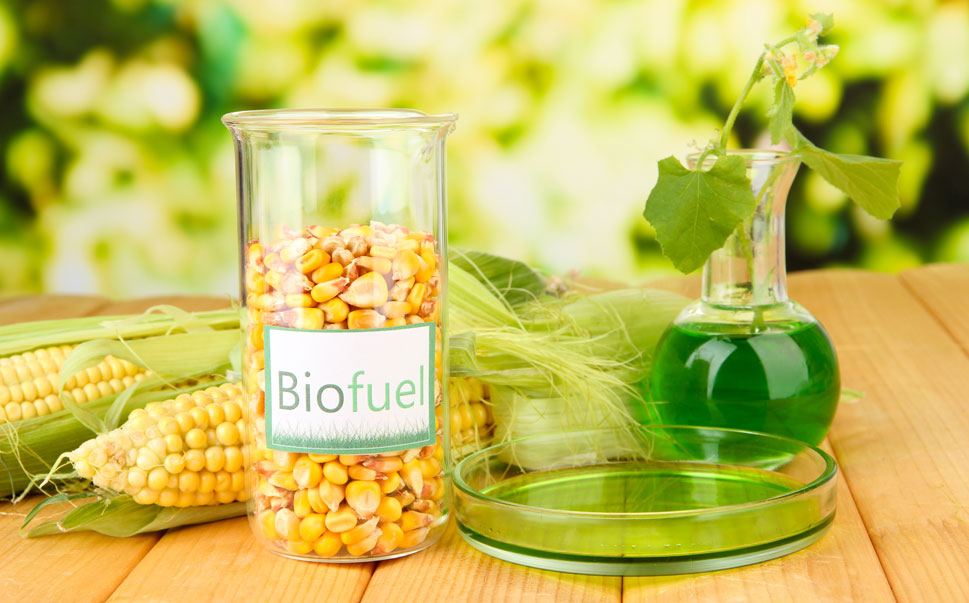Biofuel is derived from the biological material mainly from plants, microorganisms, agricultural wastes. The organic biofuels are produced by the biological processes conversion either by thermal combustion or by other advanced technologies. Depending on the origin of source and the deployed technology for the production of biofuels they are called as first, second and third generation biofuels, while the fourth generation biofuels are by making use of novel synthetic biology tools. Today’s world is seeking for a sustainable bioeconomy especially based on the usage of solar energy. The increasing demand of replacing the nonrenewable source of energy the fossil fuels has elevated the usage of renewable fuel produced and consumed. Moreover, in the current scenario of emerging concerns about competition of land for food and fuel production, scientific breakthroughs are neededto develop a fuel by use of raw materialswhich are inexhaustible, cheap and widely available.
The first generation biofuels mostly are produced directly by conversion of the crop plants which are low yielding and have negative impact on the food security. Second generation is the improvement by utilizing the live stocks of the lingo-cellulosic materials but it still needs to maximize its production rate. The third generation is based on biofuel production via algal biomass. However this approach needs to be further improved for its metabolic production as well as the separation process to get pure biofuel at reduced cost. The fourth generation is the biofuel produced - phtobiological biofuels and electrobiofuels. This occurs to bring the revolutionary change in the development of synthetic biology and technology.
Photosynthetic based biofuels
Photon-to-fuel conversion efficiency(PFCE) is term used to evaluate the percentage of PFCE is used here to describe the percentage of the energy of photons absorbed by the organism, converted to chemical energy by photosynthetic light reactions. It is expected that the fourth generation biofuels will provide higher improvements in the PFCE.
Fourth generation biofuels take advantage of the synthetic biology of algae and cyanobacteria which is an evolving and upcoming area of research nowadays. It is becoming possible to design photosynthetic/non-photosynthetic framework either naturally or synthetically to develop high quality biofuels with improved PFCE.
Fourth generation biofuels are produced (i) by designer photosynthetic microorganisms to produce photobiological solar fuels, (ii) by combining photovoltaics and microbial fuel production (electrobiofuels) or (iii) by synthetic cellfactories or synthetic organelles specifically tailored forproduction of desired high-value chemicals (production currently based on fossil fuels) and biofuels.

Photobiological solar fuels
The photobiological solar fuels aim at using the phosynthetic active microorganisms as the catalyst to harvest the solar energy and directly converting them into high quality biofuel. This process requires an engineered/tailored microorganism that will be able to secrete the fuel and simultaneously which will be collected in the bioreactor. These designer microorganisms or cyanobacterias can be immobilized and thereby the growth of the microorganism will be aimed to be temporary separated from the fuel generation process.The generation of ‘‘designer bacteria’’ with new useful properties requires revolutionary scientific breakthroughs in several areas of fundamental research.
Electrobiofuels
The new advanced technologies based on the combination of photovoltaics and microbial electrosynthesis (MES) are termed as electrobiofuels. The MES is based on the concept of capturing the energy from the electrodes i.e via solar cells or any other renewable source of energy and to assimilate the reducing equivalents into metabolism along with the CO2 utilization. The electrofuels are advantageous since they allow the renewable from the resources to be stored conveniently in the form of liquid biofuels. Recent breakthrough was achieved by using Clostridium ljungdahlii as a designer microorganism for the production of fuel butanol.
Bioengineered plants
Another platform of the fourth generation fuels is derived by generating bio-engineered plants or biomass. These engineered plants are capable of producing higher yields; considerately there is a very low barrier to cellulosic breakdown and its ability to grow on non agricultural lands or even the water bodies. In this practice the biomass crops are the main carbon capturing body which serves as a rich source of carbon that takes the CO2 from the atmosphere and deposit them in their branches or leaves or trunks. Then this carbon rich biomass is converted to the biofuel or gases by utilizing the processing techniques of the second generation techniques. The CO2 is further sequestered and stored in depleted oil and gas fields etc. This storage can last for hundreds of years or even more. The resultant fuel and gases are carbon negative and renewable. Another advantage of this method is it not only captures and stores carbon dioxide from the atmosphere; it also reduces carbon dioxide emission by replacing fossil fuels.
Current scenario of biofuels in India
India being a developing nation and has a very limited source of energy. Thereby, there is an increasing demand to reduce its dependence on non-renewable sources like fossil fuels and petroleum, and to promote biofuels. On August 10, 2018 Ministry of New and Renewable Energy has released National Policy on Biofuels, 2018. Rajasthan became the first state to implement this policy in India. This policy aims to triple the ethanol production over the next four years and has also set a target to blend 20% ethanol with petrol by the year 2030. Therefore, in the near future we can expect the generation of biofuels on a large scale all over India for sustainable and economic growth of the country.
